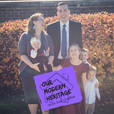
Summary: Wendy Ulrich, PhD, MBA, has been a practicing psychologist for over twenty years, and is the co-author with Dave Ulrich of the Wall Street Journal best seller, The Why of Work: How Great Leaders Build Abundant Organizations that Win (2010, McGraw Hill), as well as other books on personal change including Forgiving Ourselves: Getting Back Up When We Let Ourselves Down and Weakness is Not Sin: The Liberating Distinction that Awakens our Strengths. She is the founder of Sixteen Stones Center for Growth, providing seminar-retreats on personal growth and creating an abundant life, and she is a learning partner with the RBL Group. She has taught psychology at Brigham Young University, and is a fellow and former president of the Association of Mormon Counselors and Psychotherapists.<br> I like to say that I am a recovering perfectionist. Forgiving ourselves it about allowing yourself some grace to do what Wendy says, quoting Beverly Flanigan: giving up the hope of ever having a better past. Just move on from where you are, and do enough to make progress with what tools and skills you have. Wendy says that "mental health is the ability to respond to what really is from our deepest values." That's what I'm learning. When I think about forgiveness, the words that come to my mind are meekness and humility, faith, vulnerability, and trust. In order to apologize legitimately, we need to be humble, open and vulnerable. That vulnerability is not weakness, but it opens us up to be trusted, and to be forgiven.<br> <br> Wendy tells a cool story about a couple working to overcome the husband's addiction, and another about her willingness to help her young son stop hitting. She shares some tips on how to apologize and how to strengthen the family with forgiveness.<br> <br> I liked what Wendy says about weakness not being a sin. I think it can be compared to what Brené Brown says in her books about shame - that shame is not the same as guilt. Guilt means 'I did something bad' while shame is ' I AM bad.' When you think your weakness is a sin, you feel ashamed and you may not feel like you can change so easily, if at all. But feeling guilty means you can overcome the weakness with time and effort. Guilt is an invitation to change something that you feel bad about, and that's OK. Shame, on the other hand, may suppress the feelings that compel change because you assume change is not possible. Weakness is just a natural part of being human. When weaknesses are pointed out, it doesn't have to be shameful. It's just an invitation for growth.<br> <br> Wendy's Site: Sixteen Stones Center for Growth<br> <br> Affiliate Links: These books are Wendy's books, and also books I have read that apply to this discussion.<br> <br> Wendy Ulrich Amazon Page<br> <br> Beverly Flanigan books on forgiveness<br> <br> The 12 Week Year mentions that to be effective, we need to be accountable, that accountability is not so much consequences, as ownership.<br> <br> Crucial Conversations is a great book about how to have a discussion about difficult things. We have a tendency to revert to "silence or violence" whenever we are confronted or challenged. This book taught me that you can have important conversations even when the person I'm talking to wants to run or fight.<br> <br> Love & Respect is a marriage book that has helped me understand how couples can undermine each others' needs because they aren't sensitive to a wife's need for love, and a husband's need for respect. Excellent read.<br> <br> Daring Greatly is by Brene Brown. If you haven't read any of her books, you need to. This book is life-changing. It's about how vulnerability is crucial to our development and growth, that empathy is the remedy for shame, and to overcome anything we need to show up and be willing to face the consequences.<br> <br> <br> <br> | | | | | |
